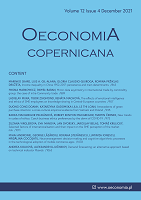New trends in codes of ethics: Czech business ethics preferences by the dawn of COVID-19
New trends in codes of ethics: Czech business ethics preferences by the dawn of COVID-19
Author(s): Radka MacGregor Pelikánová, Robert Kenyon MacGregor, Martin ČernekSubject(s): Health and medicine and law, Business Ethics
Published by: Instytut Badań Gospodarczych
Keywords: code of conduct; code of ethics; COVID-19; ethical reasoning; enterprise sustainability;
Summary/Abstract: Research background: The morality and sustainability depend upon the active engagement of all stakeholders. Businesses might have to observe minimum standards via their corporate social responsibility (CSR), but this does not imply any mandatory and enforceable requirements for their internal documents. Crises such as the COVID-19 pandemic magnify differences and might impact the perception and commitment to ethics and modify preferences. Purpose of the article: Since it is up to each and every business whether it will issue Codes of Ethics or Codes of Conduct (Codes) and how they will project ethical principles, values and concerns in them, it is both illuminative and instrumental to conduct a massive theoretical and literature review, to identify five aspects for exploration of Codes: (i) human nature (ii) moral values (iii) ethical principles, (iv) reasoning and (v) sustainability pillars, and to perform such an exploration via a case study at the dawn of the COVID-19 pandemic. Methods: Based on a massive theoretical and literature review, five aspects for exploration have been identified and employed in a case study involving twenty Codes of the largest Czech businesses, while focusing on their preferences. This is to be achieved by a holistic advanced content analysis employing meta-analysis and manual Delphi method with Likert scoring by a panel of experts. Findings & value added: The case study reveals that generally Codes prefer (i) Socrates´ perception of human nature, (ii) respect and responsibility as moral values, (iii) the principle of solidarity, (iv) social contract and deontological reasoning and (v) the sustainability social pillar. These findings demonstrate discrepancies and inconsistencies between and also within these Codes, which often paternalistically reject the multi-stakeholder approach that is needed to overcome COVID-19. This litigates for the appropriateness of this new methodology and encourages further longitudinal case studies entailing more jurisdictions and industries.
Journal: Oeconomia Copernicana
- Issue Year: 12/2021
- Issue No: 4
- Page Range: 973-1009
- Page Count: 37
- Language: English

